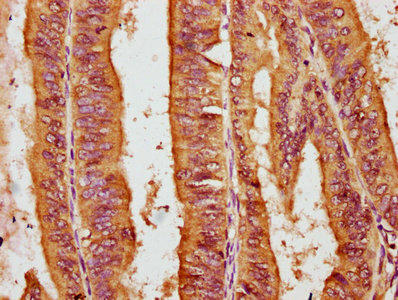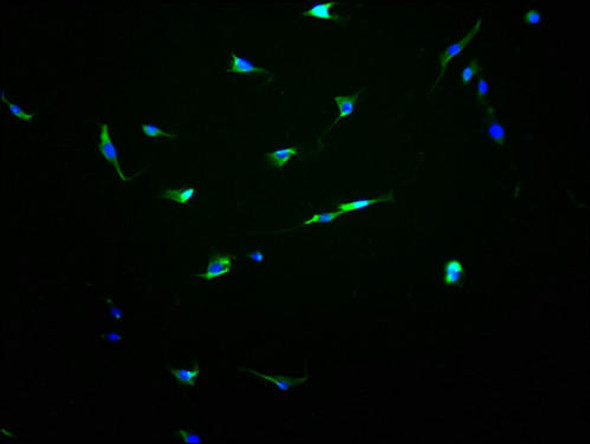Description
| Antibody Name: | PIGN Antibody (PACO60781) |
| Antibody SKU: | PACO60781 |
| Size: | 50ug |
| Host Species: | Rabbit |
| Tested Applications: | ELISA, IHC |
| Recommended Dilutions: | ELISA:1:2000-1:10000, IHC:1:200-1:500 |
| Species Reactivity: | Human |
| Immunogen: | Recombinant Human GPI ethanolamine phosphate transferase 1 protein (27-181AA) |
| Form: | Liquid |
| Storage Buffer: | Preservative: 0.03% Proclin 300 Constituents: 50% Glycerol, 0.01M PBS, pH 7.4 |
| Purification Method: | >95%, Protein G purified |
| Clonality: | Polyclonal |
| Isotype: | IgG |
| Conjugate: | Non-conjugated |
 | IHC image of PACO60781 diluted at 1:200 and staining in paraffin-embedded human endometrial cancer performed on a Leica BondTM system. After dewaxing and hydration, antigen retrieval was mediated by high pressure in a citrate buffer (pH 6.0). Section was blocked with 10% normal goat serum 30min at RT. Then primary antibody (1% BSA) was incubated at 4°C overnight. The primary is detected by a biotinylated secondary antibody and visualized using an HRP conjugated SP system. |
| Background: | Ethanolamine phosphate transferase involved in glycosylphosphatidylinositol-anchor biosynthesis. Transfers ethanolamine phosphate to the first alpha-1,4-linked mannose of the glycosylphosphatidylinositol precursor of GPI-anchor (By similarity). May act as suppressor of replication stress and chromosome missegregation. |
| Synonyms: | GPI ethanolamine phosphate transferase 1 (EC 2) (MCD4 homolog) (Phosphatidylinositol-glycan biosynthesis class N protein) (PIG-N), PIGN, MCD4 |
| UniProt Protein Function: | PIGN: Ethanolamine phosphate transferase involved in glycosylphosphatidylinositol-anchor biosynthesis. Transfers ethanolamine phosphate to the first alpha-1,4-linked mannose of the glycosylphosphatidylinositol precursor of GPI-anchor. Defects in PIGN are the cause of multiple congenital anomalies-hypotonia-seizures syndrome type 1 (MCAHS1). An autosomal recessive disorder characterized by neonatal hypotonia, lack of psychomotor development, seizures, dysmorphic features, and variable congenital anomalies involving the cardiac, urinary, and gastrointestinal systems. Most affected individuals die before 3 years of age. Belongs to the PIGG/PIGN/PIGO family. PIGN subfamily.Protein type: EC 2.-.-.-; Membrane protein, multi-pass; Transferase; Membrane protein, integral; Glycan Metabolism - glycosylphosphatidylinositol (GPI)-anchor biosynthesis; Endoplasmic reticulumChromosomal Location of Human Ortholog: 18q21.33Cellular Component: endoplasmic reticulum membrane; membraneMolecular Function: mannose-ethanolamine phosphotransferase activity; phosphotransferase activity, for other substituted phosphate groupsBiological Process: GPI anchor biosynthetic process; preassembly of GPI anchor in ER membraneDisease: Multiple Congenital Anomalies-hypotonia-seizures Syndrome 1 |
| UniProt Protein Details: | |
| NCBI Summary: | This gene encodes a protein that is involved in glycosylphosphatidylinositol (GPI)-anchor biosynthesis. The GPI-anchor is a glycolipid found on many blood cells and serves to anchor proteins to the cell surface. This protein is expressed in the endoplasmic reticulum and transfers phosphoethanolamine (EtNP) to the first mannose of the GPI anchor. Two alternatively spliced variants, which encode an identical isoform, have been reported. [provided by RefSeq, Jul 2008] |
| UniProt Code: | O95427 |
| NCBI GenInfo Identifier: | 74706012 |
| NCBI Gene ID: | 23556 |
| NCBI Accession: | O95427.1 |
| UniProt Secondary Accession: | O95427,Q7L8F8, Q8TC01, Q9NT05 |
| UniProt Related Accession: | O95427 |
| Molecular Weight: | 105,810 Da |
| NCBI Full Name: | GPI ethanolamine phosphate transferase 1 |
| NCBI Synonym Full Names: | phosphatidylinositol glycan anchor biosynthesis class N |
| NCBI Official Symbol: | PIGN |
| NCBI Official Synonym Symbols: | MCD4; MDC4; MCAHS; PIG-N; MCAHS1 |
| NCBI Protein Information: | GPI ethanolamine phosphate transferase 1 |
| UniProt Protein Name: | GPI ethanolamine phosphate transferase 1 |
| UniProt Synonym Protein Names: | MCD4 homolog; Phosphatidylinositol-glycan biosynthesis class N protein; PIG-N |
| Protein Family: | |
| UniProt Gene Name: | PIGN |
| UniProt Entry Name: | PIGN_HUMAN |






